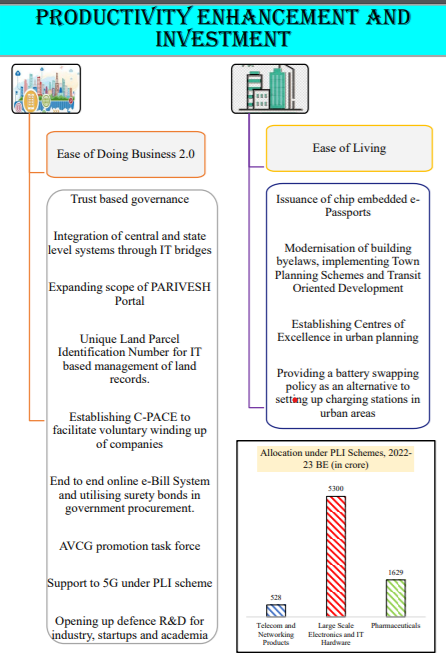Indian Economy
Budget 2022-23: Productivity Enhancement & Investment, Sunrise Opportunities, Energy Transition, and Climate Action
- 02 Feb 2022
- 7 min read
For Prelims: Constitutional Provisions related to Budget, Different Government Intervntions such as C-PACE, AVGC, etc.
For Mains: Proposals for EODB and Ease of Living, Energy Transition and Climate Action.
Why in News?
Recently, the Minister of Finance presented the Union Budget 2022-23.
- One of the priority areas is ‘productivity enhancement and investment; sunrise opportunities; energy transition and climate action’.
- It aims to ensure ease of living and doing business and to attain the vision of promoting energy transition and climate action during the Amrit kaal.
How does the Budget promote Ease of Living and Doing Business?
- Next Phase of Ease of Doing Business & Ease of Living:
- In recent years, over 25,000 compliances were reduced and 1486 union laws were repealed, result of ‘minimum government & maximum governance’, and Ease Of Doing Business (EODB).
- For the Amrit Kaal, the next phase of Ease of Doing Business EODB 2.0 and Ease of Living, will be launched.
- EODB 2.0 would entail digitisation of manual processes, integration of central and state level systems through IT bridges, single-point access for all citizen-centric services and standardisation and removal of overlapping compliance requirements.
- The government will follow the idea of ‘trust-based governance’.
- Green Clearances: Expansion of the single window portal, PARIVESH (Proactive and Responsive Facilitation by Interactive, Virtuous and Environmental Single-window Hub), for all green clearances, which was launched in 2018.
- e-Passport: e-Passports with embedded chip and futuristic technology to be rolled out.
- Urban Development: A high-level committee of reputed urban planners, urban economists and institutions will be formed to make recommendations on urban sector policies, capacity building, planning, implementation and governance.
- Urban Planning:
- Modernization of building bye laws, Town Planning Schemes (TPS), and Transit Oriented Development (TOD) will be implemented.
- Battery swapping policy to be brought out for setting up charging stations at scale in urban areas.
- Land Records Management:
- Unique Land Parcel Identification Number for IT-based management of land records.
- The facility for transliteration of land records across any of the Schedule VIII languages will also be rolled out.
- The adoption or linkage with National Generic Document Registration System (NGDRS) with the ‘One-Nation One-Registration Software’ will be promoted as an option for uniform process for registration and ‘anywhere registration’ of deeds & documents.
- Amendments in Insolvency and Bankruptcy Code to facilitate cross border insolvency resolution.
- Accelerated Corporate Exit: The Center for Processing Accelerated Corporate Exit (C-PACE) with process re-engineering, will be established to facilitate and speed up the voluntary winding-up of these companies from the currently required 2 years to less than 6 months.
- Government Procurement: To enhance transparency and to reduce delays in payments, a completely paperless, end-to-end online e-Bill System will be launched for use by all central ministries for their procurements.
- AVGC Promotion Task Force: An Animation, Visual effects, Gaming, and Comic (AVGC) promotion task force to be set-up to realize the potential of this sector.
- Telecom Sector : A scheme for design-led manufacturing will be launched to build a strong ecosystem for 5G as part of the Production Linked Incentive Scheme.
- Export Promotion: The Special Economic Zones Act will be replaced with a new legislation that will enable the states to become partners in ‘Development of Enterprise and Service Hubs’.
- AtmaNirbharta in Defence:
- 68 % of the capital procurement budget will be earmarked for domestic industry in 2022-23, up from 58% in 2021-22.
- Defense R&D will be opened up for industry, startups and academia with 25 % of defense R&D budget earmarked.
- Independent nodal umbrella body to be set up for meeting testing and certification requirements.
- Sunrise Opportunities: Artificial Intelligence, Geospatial Systems and Drones, Semiconductor and its ecosystem, Space Economy, Genomics and Pharmaceuticals, Green Energy, and Clean Mobility Systems have immense potential to assist sustainable development at scale and modernize the country.
How does the Budget promote Energy Transition and Climate Action?
- Solar Power:
- To facilitate domestic manufacturing for the ambitious goal of 280 GW of installed solar capacity by 2030, an additional allocation of 19,500 crore for Production Linked Incentive for manufacture of high efficiency modules, will be made.
- Circular Economy:
- The Circular Economy transition is expected to help in productivity enhancement as well as creating large opportunities for new businesses and jobs.
- The action plans for ten sectors such as electronic waste, end-of-life vehicles, used oil waste, and toxic & hazardous industrial waste are ready.
- Transition to Carbon Neutral Economy:
- Five to seven per cent biomass pellets will be co-fired in thermal power plants resulting in CO2 savings of 38 MMT annually.
- This will also provide extra income to farmers and job opportunities to locals and help avoid stubble burning in agriculture fields.
- Four pilot projects for coal gasification and conversion of coal into chemicals required for the industry will be set-up.
- Financial support to farmers belonging to Scheduled Castes and Scheduled Tribes, who want to take up agro-forestry.
- Five to seven per cent biomass pellets will be co-fired in thermal power plants resulting in CO2 savings of 38 MMT annually.





